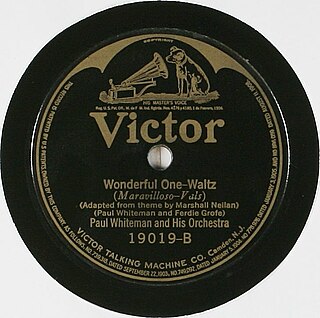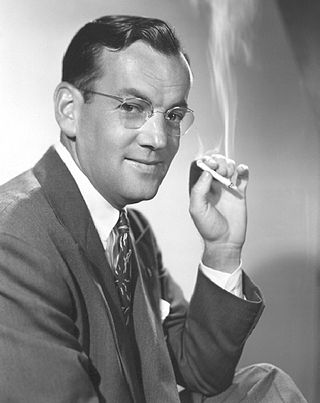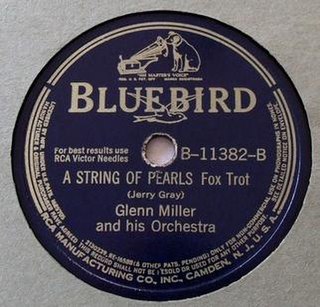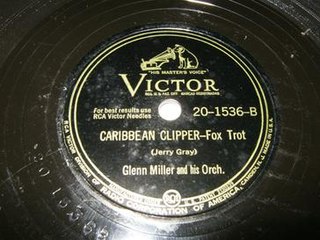
"In the Mood" is a popular big band-era jazz standard recorded by American bandleader Glenn Miller. "In the Mood" is based on the composition "Tar Paper Stomp" by Wingy Manone. The first recording under the name "In the Mood" was released by Edgar Hayes & His Orchestra in 1938.

Glenn Miller and His Orchestra were an American swing dance band formed by Glenn Miller in 1938. Arranged around a clarinet and tenor saxophone playing melody, and three other saxophones playing harmony, the band became the most popular and commercially successful dance orchestra of the swing era and one of the greatest singles charting acts of the 20th century. As of 2024, Ray Anthony is the last surviving member of the orchestra.
"Blues in the Night" is a popular blues song which has become a pop standard and is generally considered to be part of the Great American Songbook. The music was written by Harold Arlen, the lyrics by Johnny Mercer, for a 1941 film begun with the working title Hot Nocturne, but finally released as Blues in the Night. The song is sung in the film by William Gillespie.

"That Old Black Magic" is a 1942 popular song written by Harold Arlen (music), with the lyrics by Johnny Mercer. They wrote it for the 1942 film Star Spangled Rhythm, when it was first sung by Johnny Johnston and danced by Vera Zorina. The song was nominated for the Academy Award for Best Original Song in 1943 but lost out to "You'll Never Know".

John Chalmers MacGregor, better known as Chummy MacGregor, a musician and composer, was the pianist in The Glenn Miller Orchestra from 1936 to 1942. He composed the songs "Moon Dreams", "It Must Be Jelly ", "I Sustain the Wings", "Doin' the Jive", "Sold American", "Cutesie Pie" in 1932 with Bing Crosby and Red Standex, and "Slumber Song".

"Wonderful One" is a popular song recorded by the Paul Whiteman Orchestra on January 25, 1923 in New York and was released as Victor 19019-B. The record reached no. 3 on the Billboard chart. The song was also recorded as "My Wonderful One".

Sunny Skylar was an American music composer, singer, lyricist, and music publisher, often recognized as one the most prominent songwriters of the Tin Pan Alley era. Sunny Skylar had written over 300 songs according to ASCAP, and was inducted into the Songwriter's Hall of Fame in 2010.

"Moonlight Serenade" is an American swing ballad composed by Glenn Miller with subsequent lyrics by Mitchell Parish. It was an immediate phenomenon when released in May 1939 as an instrumental arrangement, though it had been adopted and performed as Miller's signature tune as early as 1938, even before it had been given the name "Moonlight Serenade". In 1991, Miller's recording of "Moonlight Serenade" was inducted into the Grammy Hall of Fame.

"Serenade in Blue" is a 1942 big band song composed by Harry Warren, with lyrics written by Mack Gordon. It was introduced in the 1942 film Orchestra Wives by Glenn Miller and His Orchestra, sung by Lynn Bari in the film but dubbed by Pat Friday.

"(I've Got a Gal in) Kalamazoo" is a #1 popular song recorded by Glenn Miller and His Orchestra in 1942. It was written by Mack Gordon and Harry Warren and published in 1942. It was featured in the musical film Orchestra Wives and was recorded by Glenn Miller and His Orchestra, featuring Tex Beneke, Marion Hutton and The Modernaires, who released it as an A side 78 in 1942, 27934-A. The B side was "At Last".

Between 1938 and 1944, Glenn Miller and His Orchestra released 266 singles on the monaural ten-inch shellac 78 rpm format. Their studio output comprised a variety of musical styles inside of the Swing genre, including ballads, band chants, dance instrumentals, novelty tracks, songs adapted from motion pictures, and, as the Second World War approached, patriotic music.

"Don't Sit Under the Apple Tree (with Anyone Else but Me)" is a popular song that was made famous by Glenn Miller and by the Andrews Sisters during World War II. Its lyrics are the words of two young lovers who pledge their fidelity while one of them is away serving in the war.

"A String of Pearls" is a 1941 song recorded by Glenn Miller and His Orchestra on RCA Bluebird that November, becoming a #1 hit. It was composed by Jerry Gray with lyrics by Eddie DeLange. The song is a big band and jazz standard.
George Dale "The Fox" Williams was a musician, composer, and an arranger for a number of major big bands, including Jimmie Lunceford, Glenn Miller, Gene Krupa, Sonny Dunham, and Ray Anthony.

"Caribbean Clipper" is a big band and jump song recorded by Glenn Miller and his Orchestra in 1942. The song was composed by Jerry Gray with lyrics by Sammy Gallop. Recorded in 1942, the song was released as a Victor 78 single by Glenn Miller and His Orchestra in 1943 as the B side to "Blue Rain".

"Here We Go Again" is a swing jazz instrumental recorded by Glenn Miller. The song was released as a 78 single. It was Glenn Miller's last Top 40 hit during his lifetime, peaking at #25.

"Elmer's Tune" is a 1941 big band and jazz standard written by Elmer Albrecht, Dick Jurgens and Sammy Gallop. Glenn Miller and his Orchestra and Dick Jurgens and his Orchestra both charted with recordings of the composition.

"Juke Box Saturday Night" is a song written by Al Stillman and Paul McGrane that was recorded by Glenn Miller and his Orchestra in 1942 on RCA Victor with vocals by Marion Hutton, Tex Beneke, and The Modernaires. The song was from the 1942 production Stars on Ice.

Up Swing is a compilation album of phonograph records released by bandleaders Tommy Dorsey, Glenn Miller, Benny Goodman, and Artie Shaw in 1944 as a part of the Victor Musical Smart Set series. The set, a progenitor to greatest hits releases, features some of the most popular Dance Band Era recordings by the four bandleaders.




















